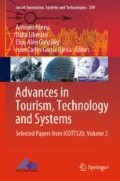Abstract
The recent pandemic caused by COVID-19 has forced unprecedented professional and social changes that affect the way people work, learn and live. Even in an era in which the digitalization of the workplace had been already widely announced, employers and employees had not expected such an urgent digital immersion of jobs with broad impacts on the professional, personal, financial and social dimensions of the workforce. In this paper, the main consequences, challenges, and effects of remote work in Portugal are reported, together with a set of recommendations for employers and workers, which were captured in survey-based research. Results show that professionals are not unanimous towards the benefits of remote work, and while some would like to resume in-person work, a substantial amount of professional, personal and financial benefits are associated to the possibility of working from home. Additionally, and according to pressing changes, professionals put forward several recommendations for employers and peers regarding workload and time management, employee assistance and self-regulated work.
Access this chapter
Tax calculation will be finalised at checkout
Purchases are for personal use only
References
Ramonia, R.R., Multiliteracies pedagogy. In: Handbook of Research on Education and Technology in a Changing Society, pp. 1005–1013. IGI Global, Hershey (2014)
Hartig, T., Kylin, C., Johansson, G.: The telework tradeoff: stress mitigation vs. constrained restoration. Appl. Psychol. 56(2), 231–253 (2007)
Anchal, C.: Dynamic workplace revolution: recent digitalization trends in organizations. In: Radical Reorganization of Existing Work Structures Through Digitalization, pp. 117–140. IGI Global, Hershey (2018)
Braña, F.-J.: A fourth industrial revolution? Digital transformation, labor and work organization: a view from Spain. J. Ind. Bus. Econ. 46(3), 415–430 (2019)
Guerrieri, P., Evangelista, R., Meliciani, V.: The economic impact of digital technologies in Europe (2014)
Carretero, S., Vuorikari, R., Punie, Y.: The Digital Competence Framework for Citizens. Publications Office of the European Union (2017)
Schwarzmüller, T., et al.: How does the digital transformation affect organizations? Key themes of change in work design and leadership. MREV Manag. Revue 29(2), 114–138 (2018)
Mesquita, A., Oliveira, L., Sequeira, A.: The Future of the Digital Workforce: Current and Future Challenges for Executive and Administrative Assistants. Springer, Cham (2019)
Mesquita, A., et al.: The Workforce of the Future - Projects and Initiatives to Overcome the Challenges Enacted by the Digital Transformation. Springer Singapore (2020)
Susskind, R.E., Susskind, D.: The Future of the Professions: How Technology will Transform the Work of Human Experts. Oxford University Press, Oxford (2015)
Gray, J., Rumpe, B.: Models for Digitalization. Springer (2015)
Rintala, N., Suolanen, S.: The implications of digitalization for job descriptions, competencies and the quality of working life. Nordicom Rev. 26(2), 53–67 (2005)
Hillman, J.: Telelifestyles and the Flexicity: The Impact of the Electronic Home: a European Study, vol. 8. Amt für Amtl. Veröff. d. Europ. Gemeinschaften (1993)
Bailey, N., Kurland, N.B.: The advantages and challenges of working here, there, anywhere, and anytime. Organ. Dyn. 28(2), 53–68 (1999)
Olson, M.H.: Remote office work: changing work patterns in space and time. Commun. ACM 26(3), 182–187 (1983)
Chen, J.C., Volk, L., Lin, B.: Virtual collaboration in the workplace. Issues Inf. Syst. 1, 77–83 (2004)
Mokhtarian, P.L., Bagley, M.N., Salomon, I.: The impact of gender, occupation, and presence of children on telecommuting motivations and constraints. J. Am. Soc. Inf. Sci. 49(12), 1115–1134 (1998)
Steward, B.: Changing times: the meaning, measurement and use of time in teleworking. Time Soc. 9(1), 57–74 (2000)
Kazekami, S.: Mechanisms to improve labor productivity by performing telework. Telecommun. Policy 44(2), 101868 (2020)
Perez Sanchez, C., Galvez Mozo, A.M.: Telework and daily life: its pros and cons for work-life balance. ATHENEA DIGITAL (15), pp. 57–79 (2009)
Hanson, R.S.: Report: Remote work in the age of Covid-19 (2020). https://slackhq.com/report-remote-work-during-coronavirus
Lopes, M.: Governo quer manter em teletrabalho um quarto dos actuais 68 mil funcionários públicos neste regime (2020)
Wong, K.: 25 Key Remote Work Statistics for 2020 (2020). https://www.business2community.com/human-resources/25-key-remote-work-statistics-for-2020-02299342
Guerra, A.R. Serviços de colaboração remota, robôs autónomos, gadgets domésticos e videojogos registam uma grande subida de interesse e utilização. 2020; Available from: https://www.dinheirovivo.pt/buzz/isolamento-e-teletrabalho-as-tecnologias-em-alta-com-a-crise-covid-19/
WEF. The future of jobs report 2018. World Economic Forum Geneva (2018)
ILO: COVID-19 and the world of work. Updated estimates and analysis (2020). https://www.ilo.org/wcmsp5/groups/public …
Belzunegui-Eraso, A., Erro-Garcés, A.: Teleworking in the context of the Covid-19 Crisis. Sustainability 12(9), 1–20 (2020)
Elavarasan, R.M., Pugazhendhi, R.: Restructured society and environment: a review on potential technological strategies to control the COVID-19 pandemic. Sci. Total Environ. (2020). p. 138858
Lima, C.: Portugueses querem ficar em casa no pós-pandemia. Imagens de Marca 2020. https://www.imagensdemarca.pt/artigo/portugueses-querem-ficar-em-casa-no-pos-pandemia/
Idealista. Teletrabalho, uma moda em tempos de Covid-19 e visto como tendência a seguir no futuro (2020). https://www.idealista.pt/news/especiais/covid-19/2020/04/08/43001-teletrabalho-uma-moda-em-tempos-de-covid-19-e-visto-como-tendencia-a-seguir-no-futuro
Eurofound. COVID-19 could permanently change teleworking in Europe (2020). https://www.eurofound.europa.eu/news/news-articles/covid-19-could-permanently-change-teleworking-in-europe
Dray, G., et al.: Livro Verde sobre as Relações Laborais (2016). http://cite.gov.pt/pt/destaques/complementosDestqs2/LIVRO_VERDE_2016.pdf
Boavida, N., Moniz, A.B.: Project Deep View: Concluding report for Portugal (2020)
Martins, P.S.: O potencial do teletrabalho em Portugal. Observador (2020). https://observador.pt/especiais/o-potencial-do-teletrabalho-em-portugal/
Cronbach, L.J.: Coefficient alpha and the internal structure of tests. Psychometrika 16(3), 297–334 (1951)
George, D., Mallery, M.: Using SPSS for Windows step by step: a simple guide and reference (2003)
Nunnally, J.C.: Psychometric Theory, 3rd edn. Tata McGraw-Hill Education, New York (1994)
Acknowledgments
This work is financed by Portuguese national funds through FCT - Fundação para a Ciência e Tecnologia, under the project UIDB/05422/2020.
Author information
Authors and Affiliations
Corresponding author
Editor information
Editors and Affiliations
Rights and permissions
Copyright information
© 2021 The Author(s), under exclusive license to Springer Nature Singapore Pte Ltd.
About this paper
Cite this paper
Oliveira, L., Mesquita, A., Oliveira, A., Sequeira, A. (2021). Emergency Remote Work in Portugal: Evaluation, Effects, and Recommendations. In: Abreu, A., Liberato, D., González, E.A., Garcia Ojeda, J.C. (eds) Advances in Tourism, Technology and Systems. ICOTTS 2020. Smart Innovation, Systems and Technologies, vol 209. Springer, Singapore. https://doi.org/10.1007/978-981-33-4260-6_27
Download citation
DOI: https://doi.org/10.1007/978-981-33-4260-6_27
Published:
Publisher Name: Springer, Singapore
Print ISBN: 978-981-33-4259-0
Online ISBN: 978-981-33-4260-6
eBook Packages: Intelligent Technologies and RoboticsIntelligent Technologies and Robotics (R0)

